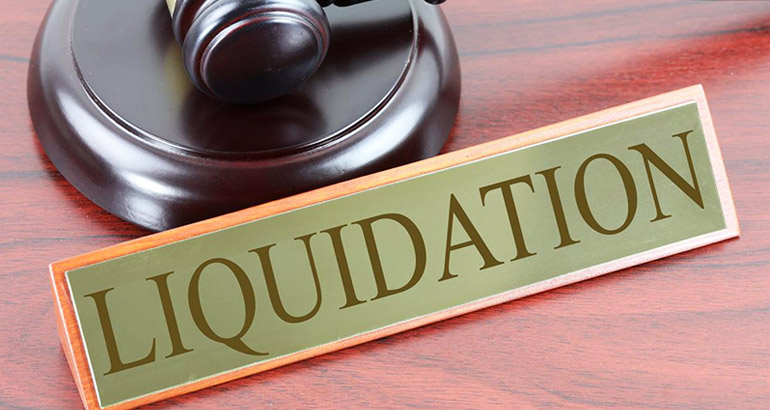The Basic Principles Of Company Liquidation
The Basic Principles Of Company Liquidation
Blog Article
What Does Company Liquidation Do?
Table of Contents7 Easy Facts About Company Liquidation ExplainedCompany Liquidation Things To Know Before You Get ThisThe smart Trick of Company Liquidation That Nobody is Talking AboutThe smart Trick of Company Liquidation That Nobody is Talking AboutSome Ideas on Company Liquidation You Need To Know
A liquidator is specifically appointed to oversee the winding up of a company's events in order for it to be shut down generally when the company is going bankrupt. The liquidator is an unbiased 3rd party that looks after the sale of firm properties in order to settle any type of arrearages.Their role consists of, however is not limited to: Unbiased Overseer: A liquidator is entrusted with functioning as an objective third party to look after the whole business liquidation process. Develop Statement of Affairs: Liquidators have to produce a detailed declaration of events document. This document is dispersed to lenders, detailing the existing monetary status of business at the time of its liquidation.
After the liquidation of a business, its existence is gotten rid of from Business Residence and it stops to be a legal entity. If supervisors navigated the procedure without issue, there would certainly be no charges or individual obligation for firm financial obligations anticipated. Currently, with a fresh start, supervisors can discover brand-new business chances, though professional examination is a good idea.
Not known Details About Company Liquidation
If more than 90% of all business investors concur, liquidation can take area on brief notice within seven days, the minimal statutory notice for lenders. Typically, the bigger the liquidation and the more properties and resources the business has, the longer the procedure will take. 'Do I have to pay to liquidate my firm?', the answer will depend upon whether your business has any type of possessions leftover when selling off.

We recognize that no 2 firms coincide, which is why we will certainly make the effort to be familiar with your organization so we can advise the most effective strategy for you. We just function in your best passions, so you can be entirely certain in the service we supply.
The Single Strategy To Use For Company Liquidation
In the UK, there Visit This Link is an established process to closing down or restructuring a restricted company, whether it is solvent or insolvent. This procedure is called liquidation and can just be handled by a qualified bankruptcy professional (IP) according to the Bankruptcy Act 1986. There are 4 primary sorts of business liquidation procedure: Lenders' Volunteer Liquidation (CVL); Mandatory liquidation; Management; and Members' Volunteer Liquidation (MVL).

In these circumstances, it is vital that the company discontinues trading; if business remains to trade, the directors can be held personally accountable and it could cause the insolvency expert reporting wrongful trading, understood as misfeasance, which might result in lawsuit. The supervisors appoint a bankruptcy practitioner and when this has actually been agreed and validated, there is a meeting with the shareholders.
The supervisors are no longer included in what occurs, consisting of the sale of the business's possessions. If the directors want any of the possessions, they can notify the IP.
Get This Report about Company Liquidation
The major distinction is that the business's creditors used to the court for an ending up order which requires the insolvent firm right into a liquidation process. Lenders take this action as a last resort since they haven't obtained payment via other forms of settlement. The court designates a bankruptcy professional, also recognized as an official receiver, to perform the obligatory company liquidation procedure.
This type of business liquidation is not volunteer and directors' conduct is reported to the UK's Assistant of State once the liquidation process has actually been completed. As a result, any supervisor that fails to comply with the IP or has actually been associated with director transgression, or a deceitful act, may lead to significant consequences (Company Liquidation).
It is used as a method to shield the company from any type of lawsuit by its lenders. The supervisors of the firm accept make regular repayments to resolve their financial debts over a time period. The selected manager view takes care of the voluntary administration process, and gets the settlements which they after that disperse to creditors according to the agreed amounts.
Not known Details About Company Liquidation
This supplies the business with time to establish a plan going forward to save the business and avoid liquidation. At this factor, directors hand control of the company over to the assigned manager. If a company is solvent yet the supervisors and investors desire to shut business, a Participants Volunteer Liquidation is the right option.
The firm liquidation procedure is managed by a liquidator appointed by the supervisors and shareholders of the firm and they need to sign an affirmation that there are no lenders remaining. The liquidation procedure for an MVL resembles that of a CVL because assets are become aware however the proceeds are dispersed to the directors and the investors of the business after the liquidator's costs have been paid.
Report this page